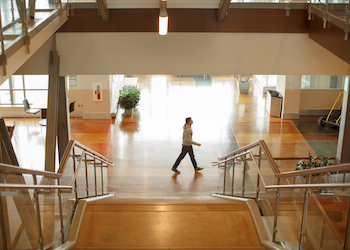- Facilities Listing
- Engineering Room Resources (Faculty & Staff)
- Laboratory Safety
-
-
CONTACT
- (414) 288-6000
-
Engineering Hall
1637 W. Wisconsin Ave.
Milwaukee, WI 53233Olin Engineering Center
1515 W. Wisconsin Ave.
Milwaukee, WI 53233 - David Newman
Director of Engineering Operations -
PROBLEM WITH THIS WEBPAGE?
Report an accessibility problem
To report another problem, please contact coeweb@marquette.edu.
GHR-funded Equipment and Resources (GEaR) Sharing Policy
Purpose
The purpose of this policy is to establish the principles for the optimal use of equipment and resources secured through a gift from the GHR Foundation. The Opus College of Engineering (OCOE) GHR-funded Equipment and Resources (GEaR) support a broad range of services, technology and expertise. The multidisciplinary scope of GEaR was designed to avoid needless duplication of scientific resources within funded research centers and program projects, enabling efficient use of technologies that serve all OCOE research efforts. GEaR equipment and resources were secured through an award competition, with funding awarded to proposals providing evidence that the equipment would provide the highest impact on college research capacity. As a guiding principle, all OCOE faculty members, their trainees, and their staff may utilize these shared resources, regardless of departmental affiliation.
To implement optimal use of GEaR, a facilitator is assigned to each resource. By default, the facilitator is the principal investigator of the grant awarded through the GEaR competition. By definition and GHR-design, GEaR is not dedicated to the work of a single research group or department, but must have equitable access to all investigators and be open for new business. Consequently, the facilitator provides access to GEaR to advance the education and research goals of the entire Opus College of Engineering. The facilitator is responsible for assuring significant year-round productivity from GEaR and will generate an annual report to document usage (see Example Report 1 and Template Report 1). The OCOE Proposal Developer will request these reports annually from the facilitator.
GEaR will be placed in space under the direct control of the facilitator. In some instances, certain equipment may be co-located. In other instances, equipment may be located within distinct laboratories. In all circumstances, the facilitator will assure access to GeAR by users. The facilitator will also assure maintenance of the equipment and develop a safety training plan for users of the equipment.
Scope
This policy applies to all research equipment purchased with OCOE resources – notably the “PLG” and “LI” awards from the GHR Foundation. Specific pieces of equipment and contact person(s) are listed below.
Water
- Liquid Chromatograph with Diode-Array Detector and Refractive Index Detector (Patrick McNamara)
- Gene Detection Equipment (Patrick McNamara)
- Thermo Gravimetric Analyzer System (Simcha Singer & Patrick McNamara)
- Zetasizer (Surface Charge Meas.) (Brooke Mayer)
- Lab-Scale Drinking Water Pipe Loop (Patrick McNamara)
- Expansion of BioSafety Level 2 Lab (Brooke Mayer)
Infrastructure
- Structures Lab Data Acquisition System (Baolin Wan or David Newman)
Imaging and Visualization
- MRI-Compatible Electroencephalography (EEG) System (Scott Beardsley)
- OCT Imaging (John LaDisa)
- Bench-Top Micro-CT (Taly Schmidt)
Combustion
- Gas Chromatograph with Mass Spectrometer (Casey Allen)
Smart Microsystems and Sensors
- Micro System Analyzer - Microstructure Vibration Analysis (Chung Hoon Lee)
- Atomic Force Microscope (Chung Hoon Lee)
- Raman Spectroscope (Chung Hoon Lee)
- Maskless Lithography System (Chung Hoon Lee)
- Micro System Analyzer (Chung Hoon Lee)
Rehabilitation
- Metabolic Cart and Instrumented Stairs (Barb Silver-Thorn)
Computer Vision and Computer Processing
- Video Tracking Equipment (Henry Medeiros)
- Graphical Processing Unit Cluster (Cristinel Ababei)
- HIL Emulator (Nathan Weise)
Cross-Theme Equipment
- Scanning Electron Microscope with Energy Dispersive Spectrometer and Network Analyzer (Raymond Fournelle)
Equipment Sharing
All equipment should be made available for sharing. An exception will be made when the equipment is already utilized at full capacity.
All OCOE researchers will have access to GEaR. OCOE constituents will have priority access; other MU researchers and external entities may be given access as capacity permits in that order of priority.
Users will have access based on availability of equipment, completion of required training and timely requests to the GEaR facilitator. Access may be restricted or revoked for violations of policies and practices regarding equipment use.
Sharing equipment internally
Equipment use should be free of charge to OCOE users; however, users should be prepared to contribute to the costs of consumables, maintenance, technician, and set-up costs. Exception: when activity is externally funded, use costs can and should be charged to assist with cost recovery where permitted by the funder terms and conditions.
Sharing equipment externally
When equipment is being shared with an external party, prior to such usage commencing:
- A risk assessment must be carried out, and ethical/governance issues considered;
- Arrangements must be made for any requisite training for users of the equipment;
- Appropriate charges for equipment use must be determined; and
- Appropriate contracts/agreements must be put in place.
Acknowledgement
Marquette University researchers should acknowledge the contribution of GEaR and others in publications. External users of GEaR should also formally acknowledge the University. Standard acknowledgement wording is as follows:
“The authors acknowledge the use of [insert equipment name] equipment from Marquette University, funded by the GHR Foundation, and the help of [Insert name or Research Group] in this research.”

